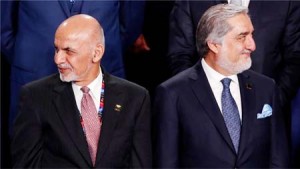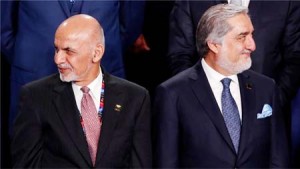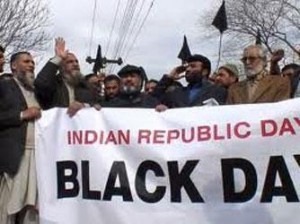- Only legitimate, effective and sustainable politics can ntangle the country from its multitude of challenges.
Al Jazeera
Davood Moradian
 If war is the continuation of politics by other means, then the four-decade-old Afghan war has become one of the world’s most entrenched political puzzles, involving many actors and dimensions.
If war is the continuation of politics by other means, then the four-decade-old Afghan war has become one of the world’s most entrenched political puzzles, involving many actors and dimensions.
The growing political crisis within the Afghan National Unity Government is compounding the ongoing security and economic crises in the country.
According to the agreement that was brokered by the United States Secretary of State John Kerry, the National Unity Government would have to implement a number of electoral and political reforms by September 2016, including organising parliamentary elections and conveying the constitutional Loya Jirga, the grand assembly.
No meaningful step has been taken to honour those promises. Many are anxiously watching how Washington and the Afghan government will handle the looming September deadline.
Former President Hamid Karzai has begun expressing his desire to challenge Washington for the US’ perceived role in delaying the required reforms.
Moreover, Washington is consumed by its own electoral fever and its reliance over its leverage.
Unfortunately, the underlying causes and possible corrective measures are being overshadowed by Washington and Karzai’s macho duel, Ashraf Ghani’s clever strategy of delay and deception, and Abdullah Abdullah’s haplessness.
US’ doublethink approach
The US military intervention in late 2001 heralded a prompt victory over the Taliban and initiating a promising and inclusive political process. It also enjoyed an unprecedented local and international consensus and legitimacy.
However, soon Iraq proved more attractive to Washington and hence its diversion from the Hindu Kush mountains to the Tigris-Euphrates river.
That distraction was further worsened by US’ doublethink approach to Afghanistan. This Orwellian concept denotes the act of simultaneously accepting two mutually contradictory beliefs as correct, often in distinct social contexts.
This was and continues to be manifested at three mutually reinforcing levels: the US’ internal decision making, its regional policy and Washington’s approach to the Afghan political scene.
From early 2002 to date, Washington remains undecided as why, how, and for how long it should remain committed to Afghanistan.
There has been an unfinished struggle between the US policy community’s strategic approach to Afghanistan and the White House’s calendar-based impulse.
Regionally, the US remains confused about its regional partners and adversaries. Pakistan was designated as US’ major non-NATO ally, while the most lethal Afghan terrorist group, the Haqqani network, was described by the US’ most senior military officer in 2011, Admiral Mike Mullen, as veritable arm of Pakistan’s military.
Washington’s handling of Afghan political milieu also suffered from a doublethink approach: promising to build a functioning democratic order while working mainly with corrupt actors and empowering ethno-nationalists.
Karzai’s multiple personalities
Karzai has become a globally-recognised politician and statesman. He sees himself as indispensable to Afghanistan’s stability and survival, while firmly believing in the political mastery of his fellow Pashtuns.
He neither advocates a suppressive theocratic order nor supports liberal secular dispensation. Such often-contradictory orientations have made him highly skilful and manipulative – a tribal, patriotic and cosmopolitan politician.
Washington’s choices were a key determinant in the rise of Karzai. One can see two versions of him: Karzai I was when he was seen by Washington as malleable, charming and helpful between 2001 and the 2007-2008 period, when Washington not only sidelined his rivals but, more importantly, gave him “a winner-takes-all” strong presidential system with its institutionalised ethnic hierarchy.
During this period, Karzai was the good guy and the Mujahideen leaders were seen as the bad guys. Karzai II (2007-2008 and present) was mainly a product of Barack Obama’s Afghan policy, which was essentially premised on disengagement from the region. Karzai II became the bad guy, and peace with the Taliban was elevated as US’ salvation.
Karzai’s strategy has been essentially a combination of manipulation of rivalling power-brokers, charm-offensive of unthreatening constituencies and brinkmanship with Washington.
His reluctance to confront the Taliban and his role in engineering the 2014 presidential election in favour of Ghani are among his bitter legacies, while he is praised for his inclusive temperament.
Ghani’s double- pronged strategy
A former World Bank consultant and anthropologist, Ashraf Ghani shares a number of characteristics with his predecessor, while pursuing different strategies.
He sees himself as a saviour destined and determined to restore the Ghilzai Pashtuns’ lost political mastery against the Durrani Pashtuns and non-Pashtuns.
His strategy has been sidelining his electoral rival Abdullah Abdullah, favouring Ghilzai Pashtuns in political life by using the means of patronage and charm-offensive of the West.
In other words, there are two Ghanis: Ghani I, an authoritarian, tribal and divisive figure for the Afghan constituencies; and Ghani II, a reformist, modernising and visionary leader for Western and donor interlocutors.
For the latter, he projects himself as the good guy, while portraying Abdullah and Karzai as the bad guys. However, he continued to be haunted by the disputed 2014 presidential election. Apart from himself and his core supporters, there is hardly any constituency that considers him a clean winner of the 2014 presidential election. Even the broker of the recent political agreement, Kerry has been quoted as saying, “If fraudulent votes were discounted, the gap closed significantly in Abdullah’s favour.”
It’s the politics, stupid
The domestic dimension of the Afghan conflict is the absence of agreement among the elites on the framework and principles of political power.
There are four broad approaches: Taliban’s terror campaign, former Mujahideen’s jihad dividends; ethnic entitlement and democratic politics. The ongoing and growing political crisis in Kabul is mainly waged by the two latter approaches. Fortunately, there are important assets and opportunities that can help the country weather its turbulent transition from a constant struggle to reasonable stability and peace. The massive participation of the ordinary people from all ethnic groups in recent elections has shown that the Afghans are striving for democratic governance, unlike their anti-democratic elites. The Afghan constitution and the political agreement that gave birth to the Afghan National Unity Government provide a clear roadmap for the way forward. Washington must resist the temptation for personalisation of its challenges and strategies. The country does not need a saviour or an indispensable fatherly figure. Only legitimate, effective and sustainable politics can untangle the country from its multitude of challenges.




